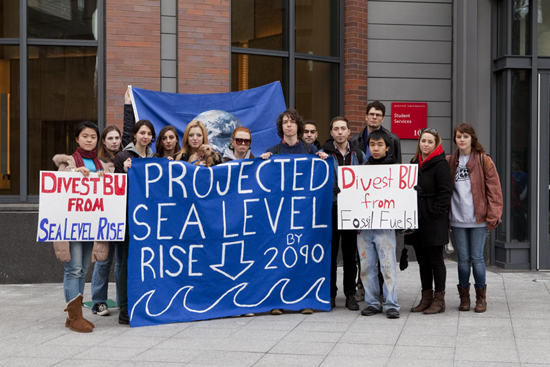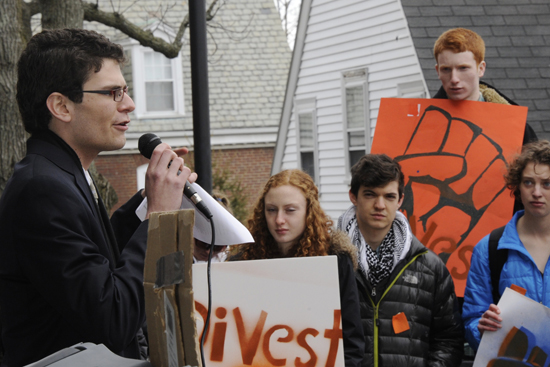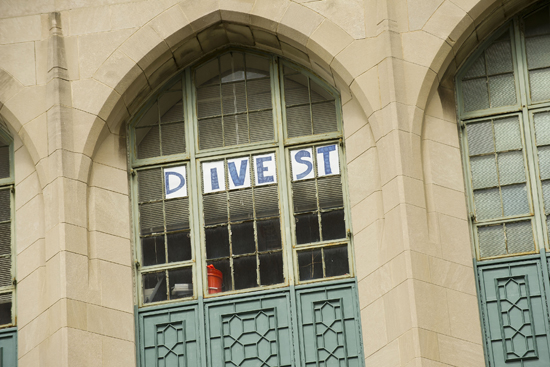DivestBU Pushes for Green Endowment
Student group wants University to divest from fossil fuels

DivestBU members outside the Center for Student Services in December with a sign showing where the sea level is projected to rise by 2090 should climate change continue at its current pace. Photo by Natalie Bergeron
Some movements start with a bang; others start more quietly, with an idea like the one planted in Benjamin Thompson’s brain after he read Bill McKibben’s July 2012 Rolling Stone article “Global Warming’s Terrifying New Math.”
McKibben, an environmental activist and author of The End of Nature and Eaarth, recapped what climate scientists have said for years—that Earth can sustain life up to another two degrees Celsius, which translates, by the Carbon Tracker Initiative’s calculation, into 565 more gigatons of carbon dioxide pumped into the atmosphere. But the world’s top fossil fuel companies control enough carbon that its combustion would belch another 2,795 gigatons of the greenhouse gas into the air. That’s five times more than the planet’s sustainable threshold, McKibben says, and enough to set off an environmental Armageddon.
McKibben’s calculations struck a chord with Thompson (GRS’17), who read the article just months before starting work on a graduate degree in mathematics. He signed up for a fossil fuel divestment retreat organized by the Massachusetts branch of McKibben’s 350.org and pitched the idea last fall to several BU environmental groups. About a dozen students joined him to form DivestBU, with the goal of encouraging the University to divest the world’s top 200 fossil fuel companies from its endowment.
“This is an industry whose continued existence depends on the end of ours,” says Thompson, whose DivestBU group meets every Sunday evening in the George Sherman Union Ziskind Lounge. “This is not an industry we should be tolerating.
“Students at BU and across the country are incredibly receptive to this idea,” he says, even though their schools’ administrations are not. “I think a lot of it is because this is our future. We’re the ones who are going to be living with this.”

Divestment campaigns have been organized at more than 270 campuses nationwide, 22 in Massachusetts, according to Shea Riester, a student divestment organizer with Better Future Project and 350.org. Since the movement began last fall, four colleges—Hampshire College, in Massachusetts, Sterling College, in Vermont, and Unity College and the College of the Atlantic, in Maine—have announced either that they’ve never invested in fossil fuels or that they will divest. Divestment advocates say universities generally carry up to 3 percent of their endowments in fossil fuels, but most do not fully disclose their investments to the public.
One of DivestBU’s first actions was writing a letter last September to President Robert A. Brown, asking him to lead the University in divestment. “Financing our education is not worth selling our future,” the letter read. “Any gains our endowment has at the cost of our future are, simply put, not sound investments.”
Brown replied in early October that he could not support the movement. “The world does not yet have viable technological and political alternatives to fossil fuels to meet its energy demands,” he wrote. “The best near-term solution is to work with fossil fuel producers to mitigate, to the extent feasible, the release of greenhouse gases—the worldwide shift to using natural gas is an important step in this direction—while developing technologically and economically sound alternative energy strategies.”
Brown also wrote that he would refer DivestBU’s request to the nascent Advisory Committee on Socially Responsible Investing, which makes recommendations to the Board of Trustees Investment Committee.
According to a 2009 National Research Council of the National Academies’ report, nonfossil fuel energy sources amounted to only 3 percent of U.S. total energy use, excluding 8 percent from nuclear power.
Brown says in an interview with BU Today that BU has divested twice in the past: first from firms invested in South Africa during the apartheid era, and again from firms doing business in the Sudan during the government-sanctioned genocide. “Divestiture,” he says, “should occur when an overwhelming majority of people conclude that it is an effective means to prevent unambiguous and egregious harm that is fundamentally at odds with the stated mission of the institution.”

In the wake of Brown’s letter, DivestBU members continued to collect petition signatures from students in classrooms and dining halls and through events like Break Up with Fossil Fuels on Valentine’s Day, when they handed out chocolates and talked to passers-by about divestment. So far they’ve collected 500 signatures, and the group hopes to hit 1,000 before delivering the petition to Brown. On April 8, DivestBU members will present their case to Student Government members, asking them to pass a resolution in support of divestment.
“The climate change crisis is the most pressing issue of our generation,” says DivestBU member Caroline Birsner (CAS’15). “Divestment is one of the tactics to address this issue.”
“The goal is not really to bankrupt these companies, but to send a message,” says Colby Smith (ENG’14), another DivestBU member. She is frustrated by her generation’s political apathy and feels divestment could be a rallying cause. “If you really want something and you see a problem, you can change it if you put in the effort.”
Laurence Kotlikoff, a William Fairfield Warren Distinguished Professor and a College of Arts & Sciences professor of economics, sympathizes with DivestBU, but doesn’t agree with them. A former protestor against the war in Vietnam, Kotlikoff says the University’s fossil fuel divestment “would have some PR impact, but it wouldn’t have much of an economic impact on these industries.” Even if every university in the country divested, he says, it wouldn’t alter the valuation of Exxon stock. He points out that BU trustees have a “fiduciary responsibility to the University, not to fixing our carbon policy and the environment.” Also, he says, divestment based on social issues is a slippery slope. Does BU then divest from alcohol and tobacco?
“What is needed to fix the environment is a carbon tax,” Kotlikoff says, “and it should be a significant one to deal with dirty energy.”
Other faculty members have fewer reservations about divestment. In December, Cutler Cleveland, a CAS professor of earth and environment, published an op-ed in the Daily Free Press expressing support.
“There are hundreds of stocks and dozens of funds that specialize in energy efficiency and low-carbon energy, and some of these exhibit impressive financial performance,” wrote Cleveland, director of the Center for Energy & Environmental Studies. “If the University views energy as an attractive area of investment, it has some clear choices other than the carbon corporations.
“Brown indicates that he is concerned about (a) climate change and (b) the performance of our endowment. He can address both by selling some fossil fuel stocks and investing the proceeds in energy efficiency on our campus!”

BU has undoubtedly become greener under Brown’s leadership. Sustainability@BU was launched in 2009 and has made strides in reducing energy use, waste, and greenhouse gas emissions through eco-friendly construction practices and renovations.
But DivestBU members see a paradox here. Smith says the University emphasizes its sustainability measures, but invests in fossil fuels; it wants to “green the campus,” but doesn’t want to “green the portfolio,” she says. “It’s fighting the problem, but it’s not fighting the cause.”
Nathan Phillips, a CAS professor of earth and environment, is inspired by DivestBU and believes student members are part of the University’s long-standing tradition of leadership on social issues—from women’s rights to civil rights.
Divestment is “one of the very biggest issues of our day and the question is, are we going to get serious about it now? And if not now, when?” Phillips says. “If we keep saying ‘foreseeable future,’ we just keep kicking the can down the road.”
DivestBU meets every Sunday at 5:15 p.m. in the Ziskind Lounge, on the second floor of the George Sherman Union, 775 Commonwealth Ave. All students, faculty, staff, and alumni are welcome to attend.
This Series
Also in
BU Clubs
-
May 3, 2022
Promoting the Beauty of Natural Hair
-
April 27, 2022
Yes, BU Has an Equestrian Team. And It Just Had a Record Season
-
April 6, 2022
BU Climbing Club: Rookies, Vets Test Their Physical and Mental Agility

Comments & Discussion
Boston University moderates comments to facilitate an informed, substantive, civil conversation. Abusive, profane, self-promotional, misleading, incoherent or off-topic comments will be rejected. Moderators are staffed during regular business hours (EST) and can only accept comments written in English. Statistics or facts must include a citation or a link to the citation.